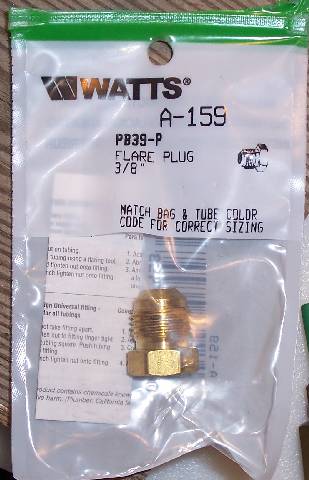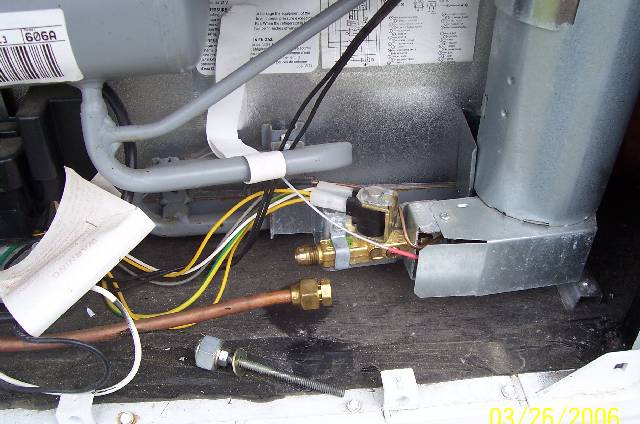Hi Sallyforth,
To some of your questions I will try and help. I will not be back on line for a few days but others can help too and more info will help them to help you better.
The water leak, Your note seemed to indicate you have 3 problems areas right now. Please let us know we have that right.
1. With the hot water heater connected you have a major rush of water coming out of something under the heater? If this is correct you may have a split tank (cracked tank) on the water heater or cracked pipe fittings. You have to sort that one out which it is.
2. You bypassed the hot water heater and then the leak slowed down but you still have water leaking from somewhere in that general area. Is this is correct? You may have cracked piping or other fittings. If there was a water heater tank crack from the prior owner not winterizing the camper correctly, then there may be many other places of cracked piping.
3. The leak at the toilet from the back area. In this case, see if you can find out what the make and model is of the toilet so others can help. Sunline changed types and brands over the years and many of us do not know which you have.
What it sounds like you "might" have going on is the vacuum breaker valve setup, if yours has one, it is cracked again possibly from a prior owner not winterizing correctly and water in the system froze and cracked it.
With the amount of leaks you have, using water to troubleshoot can be somewhat painful if the leaks are large. It will for sure work, just we do not know if the leaks are large or drips. If they are large and someone has a small air compressor it can help. They only need to use 10 to 15 psi of air with a pressure gage installed in the camper water supply line, then you can charge the camper with low pressure. See the gage rise up, then stop adding air and see if the pressure bleeds off. If it bleeds off back close to 0 quickly you have a leak somewhere.
Then you can leave the low pressure on and go listen and feel for the air leaks. You do not need to use any pressure over 30psi for this test. Going a lot higher can cause other leaks and also dangerous issues until you know the system is pressure tight.
On the LP gas smell. This is very concerning. If you smell the gas that large, "stop" and shut the tanks back off. There can be a leak in the gas system and that can be very dangerous. You are very wise to be concerned about this.
You did not say where you smelt the heavy LP gas smell. But you said when you turned on the gas it smelled heavy.
Going out on a limb here thinking it was at the LP tank, here is something simple to try. I do not know if your older camper has been converted to the new style plastic nuts on the LP tank connection. The older ones are all brass and left hand thread. The newer ones are plastic, black or green in color and are right hand threads.
Sometimes that tank fitting connection is not good and a leak will come as soon as the tank is opened and can be a lot of leak as that is high pressure gas. You can use LP gas leak solution to look for bubbles around the tank connection. Soapy water solution also works too. Coat all the fittings with the leak solution. You can see the leak bubbles.
Beyond that this gets more complex. If you bought the camper and this is the first time you are trying to get the LP gas to work and your smelling this, I would recommend you find a LP gas service person who can do a LP gas pressure drop test. And they can help hunt down the leak.
This post can help show the 3 tests they need to do.
http://www.sunlineclub.com/forums/f7...cks-10981.html
The LP gas tech can be someone who services home gas systems or someone from a RV repair shop. You may have a leaking pressure regulator by the tanks or a hose leak or other gas appliance valves leaking. Unless you have had prior experience in troubling gas and the safety behind it, this is hard to learn from a one time post.
To the fridge not working, we need more info on this on what does or does not work. What make and model is it? And tell us how you know it does not work? A RV fridge does not have a compressor like a home fridge, and you will not hear the same kind of home noises. An RV fridge when it is working right can take 8 plus hours to cool down.
I would not try the fridge on gas until you sort out the LP gas smell issue. There is a live flame on the fridge when using gas. When using it on electric there is no flame.
Hope this helps.
John




















 no dice. Thanks for the propane line tips, while I was researching I did notice that thankfully to replace those will probably be the cheapest repair I will make lol
no dice. Thanks for the propane line tips, while I was researching I did notice that thankfully to replace those will probably be the cheapest repair I will make lol


 Linear Mode
Linear Mode




